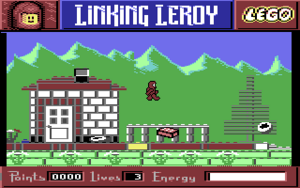Linking Leroy: Difference between revisions
this one is complicated. |
|||
| Line 34: | Line 34: | ||
[[Category:Commodore 64 games]] | [[Category:Commodore 64 games]] | ||
[[Category:Side-scrolling platformers]] | [[Category:Side-scrolling platformers]] | ||
[[Category:Single-player video games]] | |||
[[Category:Video games developed in Sweden]] | |||
[[Category:Unofficial LEGO video games]] | [[Category:Unofficial LEGO video games]] | ||
Revision as of 14:48, 18 June 2024
| Linking Leroy | |
|---|---|
 Screenshot of gameplay | |
| Developer(s) | FairLight |
| Programmer(s) |
|
| Artist(s) | Ogami |
| Platform(s) | Commodore 64 |
| Release | 19 April 1992 (demo)[1] |
| Genre(s) | Platformer |
| Mode(s) | Single-player |
Linking Leroy is a series of game demos developed by FairLight for Commodore 64. It is one of the earliest unofficial LEGO video games.
Gameplay
Linking Leroy is a side-scrolling platform game. The player controls Leroy, a red LEGO astronaut from the Legoland Space product line.[2] Leroy can move left or right to scroll the level, and can jump and crawl to traverse obstacles. Touching enemies drains Leroy's energy meter, causing him to lose a life if it runs out; in the Legoland 2 demo, running out of lives causes the game to end and move on to the next demo in the collection.[1] There is also a points counter, but it is not functional.
Two demo levels were created for the game, both of which are short and looping with no objectives. The first level, featured in Legoland 2, is set in a colourful LEGO environment with LEGO houses and trees and a mountainous backdrop.[2] Collectable red bricks are scattered through the level, as are amorphous bouncing enemies. The second level, released with the title of Linking Leroy Visits Legoland, takes place on an alien planet and features many Legoland Space sets in the background. This level contains more enemies and no collectables, but includes objects Leroy can bounce off of. Pressing Ctrl+⇧ Shift+⇧ Shift in either demo opens a level editor, where the player can alter the layout and collision.[3]
Development
The concept for Linking Leroy was originally created by FairLight member Bacchus (Pontus Berg) in 1991.[1][4] Bacchus developed the game's controls, scrolling, level editor, and environment detection;[1] Bacchus also named the character of Leroy.[3] Further development was done by Harlekin (Magnus Nyman), including the addition of LEGO graphics created by the group's graphic artist Ogami.[1][2] Bacchus had a connection with a marketing manager at the LEGO Company, who sent the group promotional and giveaway items including sweatshirts and bands.[1] The developers hoped that LEGO would endorse the game, but were unsuccessful, and their connection to the company later broke.[4][3]
References
- ↑ a b c d e f Jazzcat (11 October 2010). "The Delight of Eternal Might - The History of FairLight". Recollection. Issue 3. Archived from the original on 6 April 2024. Diskmag version.
- ↑ a b c Gasking, Frank (4 October 2012). "Linking Leroy". Games That Weren't 64. Archived from the original on 5 April 2024.
- ↑ a b c Berg, Pontus [Bacchus] (2014). "Initial coder of the game reporting in :-)" (comment on YouTube video "Unfinished 1992 LEGO Commodore 64 Game" by jamessterV2). Archived from the original on 29 January 2021. Berg's comment has been preserved in the video's description as of 16 November 2019, due to comments on the video being disabled. Off-site copy of the comment available here.
- ↑ a b Nyman, Magnus [Harlekin] (17 July 1996). "Linking Leroy visits SpaceLand!". Passagen. Archived from the original on 23 October 1999. The date was obtained from the date modified of the two images on the page, which was viewed by using wget to download them.
